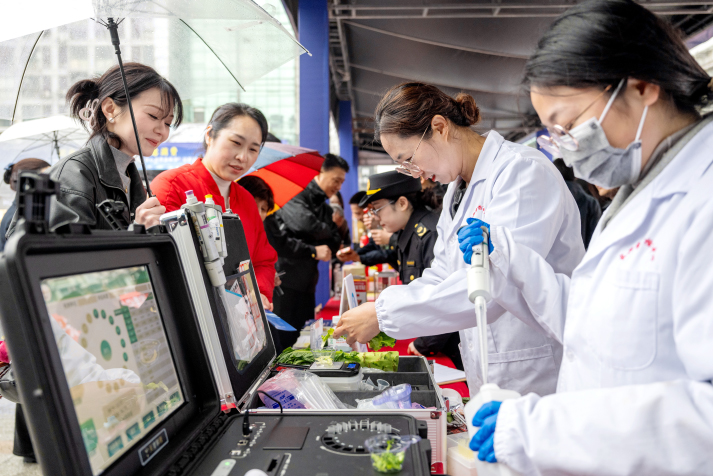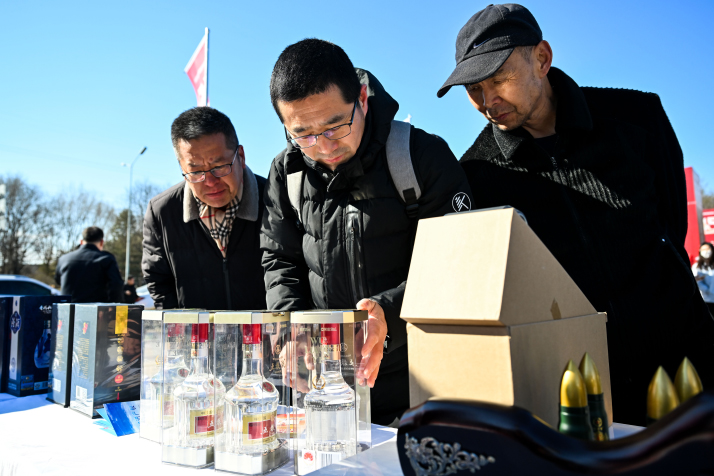| China |
| How rights protection initiatives empower consumers and regulate markets | |
|
|
 Officials from the local market regulatory department test products for food safety in Huzhou, Zhejiang Province, on March 15 (XINHUA)
Since its inception in 1991, the 315 show, an annual live broadcast on state broadcaster China Central Television, has attracted rapt national attention. The program, with its name in reference to World Consumer Rights Day on March 15, is part of China's engagement with the global initiative, with the purpose of exposing business activities that infringe on consumer rights and also of promoting market regulation. Over the years, the program has brought to light regulatory violations by many domestic and foreign brands. "After the cases are revealed at the event, brands often face significant public pressure and market losses, which prompt them to quickly implement remedial measures. For example, following the exposure of the pickled vegetable scandal, the involved companies not only removed the shoddy products from shelves but also comprehensively upgraded their production lines," Zhang Wei, Secretary General of the China Association for Quality Promotion, a non-profit organization focused on customer rights protection, told newspaper Economic Daily. "The pickled vegetable scandal" was made public on the 315 show in 2022. The report exposed how the production processes of some traditional pickled vegetable products caused serious health risks to consumers. Involved brands were later punished by market regulators. Market regulations This year's 315 show exposed violations in some of the latest consumption trends. For example, in recent years, online home appliance repair platforms have mushroomed. The emergence of such companies relieves many consumers of the need to visit offline outlets to find technicians. Instead, they simply describe the issue on an online platform and book a door-to-door service. One of the largest of these platforms Zmn.cn was accused of using deceptive tactics. One example was that the platform charged 100 yuan ($13.8) for fixing a faucet and 250 yuan ($34.5) for replacing the igniter of an oven or stove, while the normal charge for such services is only 20 yuan ($2.76). It also encouraged technicians to induce consumers into making large unnecessary expenditures. Additionally, the company reportedly took 60 percent of the service fee. On March 16, the platform announced six major measures to address the problems reported on the show. These include reviewing all bookings resulting in complaints, implementing pricing transparency reforms to eliminate ambiguous charges, strengthening the management of employees, safeguarding the right of users to be informed about the real status of their appliances, and restructuring the income system for technicians. "Enterprises are supposed to take the initiative to fulfill their social responsibilities, instead of reacting passively after their violations are exposed. By strengthening internal management and improving the quality of their products and services, they can regain consumer trust," Zhang said. This year's program also highlighted new issues arising from the development of AI technology. Several outbound call companies have utilized AI to make harassing calls, disregarding customer privacy. By registering unverified social media accounts that do not require real-name authentication and operating these accounts using AI robots that can simulate human speech, companies can create tens of thousands of "virtual salesmen" to badger consumers at very low cost. Such practices violate the Law on the Protection of Consumer Rights and Interests, but companies have circumvented market regulation through technical means, resulting in large-scale illegal marketing. After the show, the Ministry of Industry and Information Technology coordinated related authorities in Beijing, Shanghai and Guangdong Province to investigate the companies behind the violations. They ordered telecom operators to suspend involved phone numbers, verify the circumstances related to personal data information leakage, and urged Internet platforms to completely clean up illegal promotion information for intelligent outbound call tools. "With the widespread adoption of digital consumption and advancements in technology, consumer rights protection faces new challenges, such as personal information leaks and online fraud. In the future, the government needs to further strengthen related legal frameworks, particularly in the areas of data security and online consumption," Chen Lin, a research fellow at the Chinese Academy of Social Sciences Institute of Law, said.  Consumers observe the differences between real and counterfeit products at a consumer rights awareness event in Hohhot City, Inner Mongolia Autonomous Region, on March 15 (XINHUA)
Promotion of protections In China, many government departments have developed a tradition of organizing events related to the protection of consumer rights around March 15. These efforts aim to assist consumers in identifying counterfeit and substandard goods and avoiding consumption traps, as well as raise their awareness of the legal avenues and methods available for safeguarding their rights. On March 13, during an event co-organized by government departments in Laoting County, Hebei Province, special lectures were given on how to identify shoddy and fake medicines, cosmetics, home appliances and food products. The participating officials distributed over 10,000 leaflets, addressed more than 150 inquiries from customers, and handled five onsite complaints. In Jinggu Dai and Yi Autonomous County in Yunnan Province, the local market regulatory authority hosted an exhibition in a public square showcasing a wide variety of counterfeit commodities that it recently confiscated, helping the public to recognize the characteristics and risks of such products. At the end of the event, 10.3 tons of counterfeit goods, worth 86,000 yuan ($11,867), were destroyed. These items included daily necessities, food and health products. "The purpose of the activity is to deter businesses engaged in the production and sales of fake products, while also raising consumer awareness and encouraging them to actively safeguard their legitimate rights," Pan Liang, an official from the market regulatory bureau of Jinggu, said. In addition to government departments, social organizations are also making contributions to the protection of consumer rights. On March 15, volunteers organized by the lawyers association in Baoding, Hebei Province, set up legal consultation booths in the city center, distributing legal manuals, and conducting interactive Q&A sessions. They addressed over 60 legal inquiries from businesses and consumers and distributed more than 400 copies of the Consumer Rights Protection Guide compiled by the association. "I answered many customer inquiries today, including questions about how to avoid online fraud, how to claim compensation for purchasing counterfeit or substandard goods, and how to report false advertising. I hope such efforts can give consumers more knowledge about the lawful methods to protect their rights," Li Bin, a law student who volunteers at legal inquiries, told Beijing Review. "The protection of consumer rights relies as much on strengthening consumer education as on the advancement of related laws and regulations. By raising awareness of rights protection among consumers, we can effectively reduce the occurrence of infringements. Therefore, the 315 show is not only an exposure platform but also an excellent opportunity for spreading related knowledge," Zhao Min, Director of the Consumer Guidance Department at the China Consumers Association, a national organization that monitors goods and services to protect the rights and interests of consumers, told newspaper China Consumer News. Copyedited by G.P. Wilson Comments to zhangyage@cicgamericas.com |
|
||||||||||||||||||||||||||||||
|